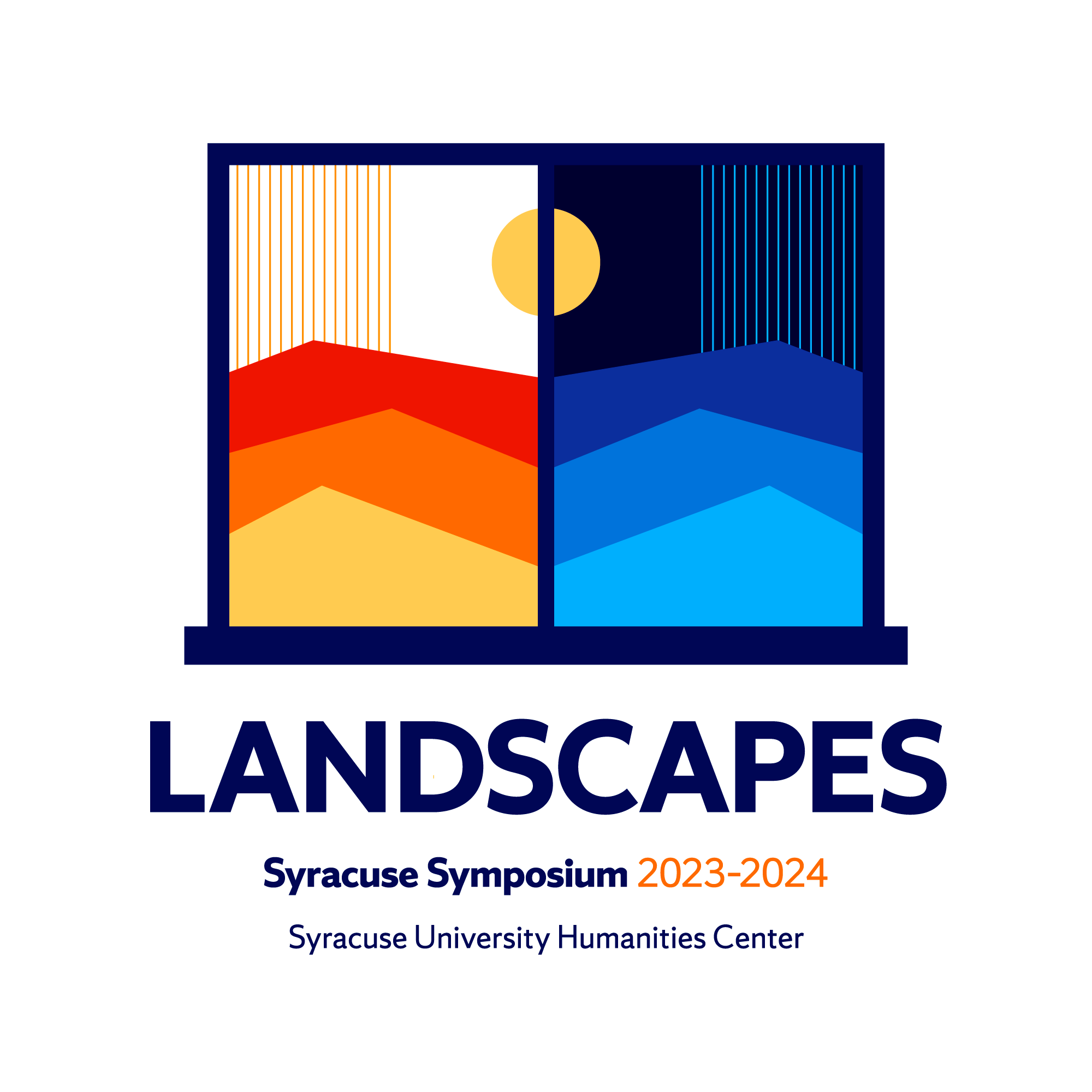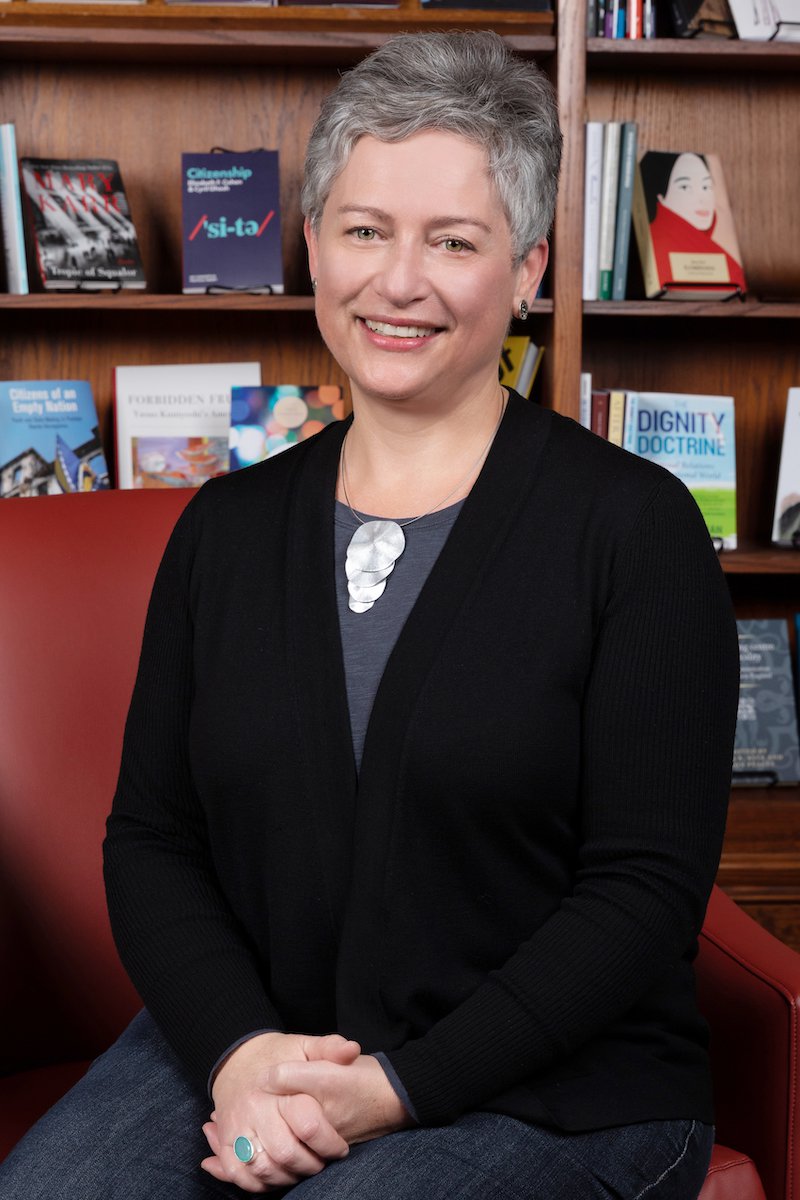20 Years of Syracuse Symposium
The Syracuse University Humanities Center celebrates the evolution of Syracuse Symposium this year, with offerings that include the SU Human Rights Film Festival, a Peter B. Jones art exhibit, and a mini-seminar, “All Writing is Environmental Writing.”

Even if you haven’t participated in Symposium offerings yet, the intriguing and provocative annual themes still may have caught your eye. Topics like Justice (2007-08), Identity (2011-12), Repair (2022-23) and this year’s Landscapes, offer a kaleidoscopic platform for timely and urgent discussions held in a variety of immersive formats. Returning for its 20th anniversary season, Syracuse Symposium , a public event series organized by the Syracuse University Humanities Center (SUHC) in the College of Arts and Sciences (A&S), is comprised of performances, exhibits, films, lectures, workshops and readings.

This series is core to the Center’s mission to advance humanities research, showcase the humanities as a public good, and enhance the scholarly community by bringing people together to confront some of the most pressing issues of our time.
"The humanities provide important conduits for imagining a more just world and addressing inequity," says Humanities Center Director, Vivian May. "Shared experiences in film, music, fiction, philosophical pursuits, or the visual arts, for example, can immerse us in new perspectives and open up space to engage in critical, even difficult dialogues."
To commemorate the milestone, we sat down with Vivian to reflect on the Symposium's origin, evolution and future.
What is the significance of Syracuse Symposium within the context of the Humanities Center’s mission?
Vivian May (VM): The series, which pre-dates the Center’s founding in 2008, originated as a significant collaboration between A&S and the Chancellor’s Office to bring the University community together to examine the world of ideas via keynote speakers and diverse events proposed by teams of faculty. Nearly all Syracuse University schools and colleges have partnered with us over the years. Maintaining that University-wide lens, and strengthening longstanding alliances, the series continues to break down institutional silos to engage our wider community. Syracuse Symposium plays a role in fostering inclusive, engaged intellectual spaces for diverse publics.
Originally, Symposium was contained to one semester but has grown into a series of events held throughout the year. Can you share why you and your team expanded the format and how it has changed the outcome of the event?
VM: In many ways, we expanded out of necessity. Interest in collaborating with the Center has grown, so widening the season’s timeframe allows us to support more partners. Shifting to an annual lineup has also allowed for pivotal collaborations in spring tied to Black History Month and Women’s History Month. We are always fine-tuning our offerings to meet the needs of our scholarly community. This format enables us to engage across the academic year for a range of curricular tie-ins and community engagement.
The themes change each year and shape the narratives and conversations of the event series. What factors and considerations guide the annual theme selection?
VM: We’re grateful to have a humanities-passionate Advisory Board composed of faculty and academic staff from across campus. We solicit concepts from the board, which are then evaluated and voted on, up to two years in advance. We aim for concepts with multi-faceted, relatable connotations across disciplines and for diverse publics. A strong theme tends to have nuanced valences, and by this, I mean room to riff on possible interpretations. To flesh out its full potential, it should be broad enough for different genres, disciplines and audiences. For instance, most Symposium themes evoke both positive and negative aspects—including recent themes such as Silence, Futures, and Repair. The ambiguity leaves room for interpretations through many lenses.
How have 20 years of Symposium enhanced the Syracuse experience for students and faculty?
VM: Through Symposium, faculty and students have access to intimate, curated opportunities to engage with renowned authors, musicians and filmmakers, to dive into a hands-on workshop or immersive experience. They can connect across disciplines to take up the big questions of our day. There have also been Symposium themes woven into courses and first-year experiences. For A&S faculty, one of the Center’s annual Faculty Fellowships ties into the annual theme, helping to support cutting-edge research in different areas each year.
Also, student work is frequently showcased. For example, this fall one of the films to be screened at the Syracuse University Human Rights Film Festival (SUHRFF), Fracture, on September 23, is by a doctoral student in literacy education, Evan Starling-Davis. Sometimes graduate students partner with faculty to propose and host Symposium events—this year, Family Pictures Syracuse activities on October 14 and November 15 are being organized by the Turning the Lens Collective, which has student, faculty, staff and community members in the mix.
Syracuse Symposium is known for its public engagement. Can you elaborate on how the series bridges the gap between the university and the community, making humanities topics accessible and compelling for a non-academic audience?
VM: We are proud to support a range of thought-provoking programming that’s free and open to all—students, staff, faculty, and community members. One of our longest-standing partners, SUHRFF, taking place from September 21 to 23 this year, offers a clear, visible example of broad community engagement. Where else can colleagues, friends, family, and neighbors gather, at no cost, to see a weekend’s worth of acclaimed films, and oftentimes chat directly with the filmmakers afterward?
The Engaged Humanities Network’s Environmental Storytelling Series, in Spring 2024, is another example of strong public-facing offerings. In partnership with SUNY–ESF, the series has an inclusive, multi-generational approach to addressing the climate crisis.
Looking ahead to the next 20 years, how do you envision further evolution of the series?
VM: Syracuse Symposium will, I think, have a certain constancy—the humanities shall always lie at the heart of the series and evolving research will shape new questions, genres, formats and solutions to help address the key questions and problems of the day.
Importantly, Symposium’s kaleidoscopic lens--from theme generation to lineup--means it is a collective vision and shared endeavor. It will continue to pivot, take up new technologies, and unpack hidden narratives or silenced histories. No matter how our knowledge landscape changes, however, I do believe that keeping an eye on how to pursue a more just world, together, will always be core to what Syracuse Symposium is about.
This year’s theme, Landscapes holds significance on multiple levels – personal, societal and environmental. What will the lineup delve into and, for someone who’s never attended, tell us something that will entice them to check it out.
VM: In addition to the many examples cited above, this year’s Symposium partners explore everything from the Constitution, immigration, border politics, environmental justice and reproductive rights. One of the first events, on September 14, showcases the remarkable ceramics of Peter B. Jones. His work has revived traditional Haudenosaunee pit firing, hand-built coiling and slab construction, via an exhibition at the SU Art Museum. Another on October 4 brings together educators and STEM scholars who use digital technologies and creative makerspaces to highlight minoritized youth as knowers. We are also excited to be partnering with YMCA Arts to host poet and essayist Camille Dungy on November 16 and 17, author of Soil: The Story of a Black Mother's Garden. I encourage everyone in the Greater Syracuse community, the University and beyond, to check out the list of events and connect!
